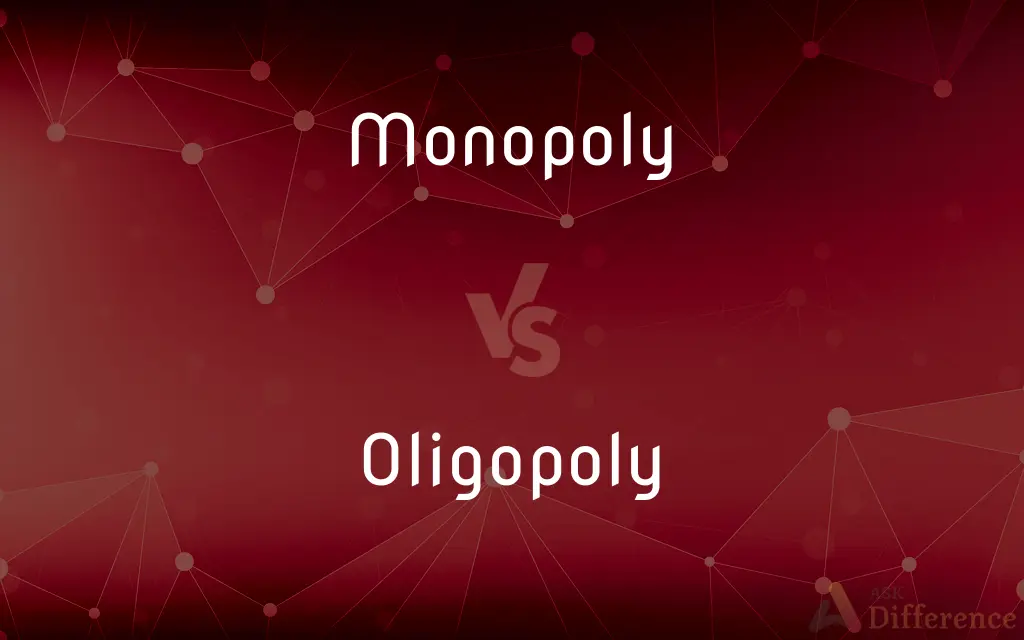Monopoly vs. Oligopoly — What's the Difference?
By Tayyaba Rehman & Urooj Arif — Updated on March 25, 2024
Monopoly involves a single entity controlling a market, e.g., a utility company, while oligopoly is characterized by a few entities dominating, e.g., major airlines.

Difference Between Monopoly and Oligopoly
Table of Contents
ADVERTISEMENT
Key Differences
In a monopoly, a single company or entity has complete control over a particular market or product, making it the sole provider. This dominance allows the monopolist to set prices and control the supply without competition. On the other hand, an oligopoly consists of a few companies or entities that dominate a market, leading to limited competition. These companies often set prices collaboratively or follow a price leadership model, significantly influencing market conditions and entry barriers for new competitors.
Monopolies often arise in markets with high barriers to entry, such as utilities or patented technologies, where the cost of entry is prohibitive for potential competitors. This can lead to less innovation and higher prices for consumers due to the lack of competition. Whereas in an oligopoly, while there are few competitors, the presence of more than one player can still foster some level of competition and innovation, potentially benefiting consumers with better products and services, though prices may still be higher than in a fully competitive market.
Regulatory bodies may intervene in monopolistic markets to protect consumer interests, prevent abuse of market power, and ensure fair pricing. Such interventions are less frequent in oligopolies, where competition exists, albeit among a few companies. However, antitrust laws and regulations can still apply to prevent collusive behaviors and promote competition within oligopolies.
The strategic behavior in monopolies focuses on maintaining market dominance, often through innovation barriers, exclusive rights, or scale economies. In contrast, companies in an oligopoly might engage in non-price competition (such as advertising and product differentiation) to capture more market share without triggering price wars, which could erode profits for all players involved.
Market dynamics in a monopoly are relatively stable, with predictable pricing and supply, as the sole provider dictates these aspects. In an oligopoly, market dynamics can be more volatile, with firms reacting to each other’s actions in terms of pricing, product offerings, and marketing strategies, leading to a more dynamic market environment.
ADVERTISEMENT
Comparison Chart
Definition
Market with a single seller.
Market dominated by a few sellers.
Competition
None.
Limited, between a few major players.
Market Entry Barriers
Very high, often insurmountable.
High, but varies depending on the industry.
Price Setting
Sole provider sets the price.
Prices often set collaboratively or follow price leadership.
Innovation
Less incentive due to lack of competition.
More than monopoly but less than in competitive markets.
Regulatory Oversight
Often significant, to prevent abuse of dominant position.
Present to prevent collusion and ensure fair competition.
Examples
Utility companies, patented drugs.
Airlines, oil companies, telecommunications.
Consumer Impact
Higher prices, fewer choices.
Potentially higher prices, some variety and innovation.
Compare with Definitions
Monopoly
The exclusive possession or control of something.
One company's monopoly over the software market is challenged by new startups.
Oligopoly
A state of limited competition, with a market dominated by a few sellers.
The automotive industry is an example of an oligopoly with major brands dominating.
Monopoly
In economics, a scenario where a single firm is the sole producer.
The company's monopoly was broken up by antitrust laws.
Oligopoly
A market structure characterized by a small number of large firms.
The airline industry's oligopoly leads to similar pricing and services.
Monopoly
A market condition where a single entity controls the entire supply of a product or service.
A local utility provider might be the only source of water for a city.
Oligopoly
Firms within an oligopoly might compete or collaborate.
Tech giants in an oligopoly sometimes collaborate on standards.
Monopoly
Exclusive control over trade or supply.
The postal service had a monopoly on mail delivery.
Oligopoly
When a few companies have control over a commodity or service.
In many countries, a few telecom companies form an oligopoly.
Monopoly
A board game where players deal in property trading.
We played Monopoly to learn about real estate and banking.
Oligopoly
The economic condition where few businesses significantly impact the market.
The digital advertising oligopoly controls a vast portion of online ads.
Monopoly
A monopoly (from Greek μόνος, mónos, 'single, alone' and πωλεῖν, pōleîn, 'to sell') exists when a specific person or enterprise is the only supplier of a particular commodity. This contrasts with a monopsony which relates to a single entity's control of a market to purchase a good or service, and with oligopoly and duopoly which consists of a few sellers dominating a market.
Oligopoly
An oligopoly (from Greek ὀλίγος, oligos "few" and πωλεῖν, polein "to sell") is a market form wherein a market or industry is dominated by a small group of large sellers (oligopolists).
Monopoly
Exclusive control by one group of the means of producing or selling a commodity or service
"Monopoly frequently ... arises from government support or from collusive agreements among individuals" (Milton Friedman).
Oligopoly
A market condition in which sellers are so few that the actions of any one of them will materially affect price and have a measurable impact on competitors.
Monopoly
A company, group, or individual having exclusive control over a commercial activity.
Oligopoly
An economic condition in which a small number of sellers exert control over the market of a commodity.
Monopoly
A commodity or service so controlled.
Oligopoly
(economics) a market in which control over the supply of a commodity is in the hands of a small number of producers and each one can influence prices and affect competitors
Monopoly
Exclusive possession or control
Arrogantly claims to have a monopoly on the truth.
Monopoly
Something that is exclusively possessed or controlled
Showed that scientific achievement is not a male monopoly.
Monopoly
A situation, by legal privilege or other agreement, in which solely one party (company, cartel etc.) exclusively provides a particular product or service, dominating that market and generally exerting powerful control over it.
Monopoly
An exclusive control over the trade or production of a commodity or service through exclusive possession.
A land monopoly renders its holder(s) nearly almighty in an agricultural society.
Monopoly
The privilege granting the exclusive right to exert such control.
Granting monopolies in concession constitutes a market-conform alternative to taxation for the state, while the crown sometimes bestowed a monopoly as an outrageous gift.
Monopoly
(metonymy) The market thus controlled.
Monopoly
(metonymy) The holder (person, company or other) of such market domination in one of the above manners.
Monopoly
The exclusive power, or privilege of selling a commodity; the exclusive power, right, or privilege of dealing in some article, or of trading in some market; sole command of the traffic in anything, however obtained; as, the proprietor of a patented article is given a monopoly of its sale for a limited time; chartered trading companies have sometimes had a monopoly of trade with remote regions; a combination of traders may get a monopoly of a particular product.
Raleigh held a monopoly of cards, Essex a monopoly of sweet wines.
Monopoly
Exclusive possession; as, a monopoly of land.
If I had a monopoly out, they would have part on 't.
Monopoly
The commodity or other material thing to which the monopoly relates; as, tobacco is a monopoly in France.
Monopoly
(economics) a market in which there are many buyers but only one seller;
A monopoly on silver
When you have a monopoly you can ask any price you like
Monopoly
Exclusive control or possession of something;
They have no monopoly on intelligence
Monopoly
A board game in which players try to gain a monopoly on real estate as pieces advance around the board according to the throw of a die
Common Curiosities
What are barriers to entry in these market types?
Barriers to entry are extremely high in monopolies due to control over resources or regulation, while in oligopolies, barriers exist but are more related to scale, access to technology, or capital requirements.
What distinguishes a monopoly from an oligopoly?
A monopoly is characterized by a single entity's complete control over a market, whereas an oligopoly consists of a few entities dominating a market.
How do governments regulate monopolies and oligopolies?
Governments use antitrust laws and regulatory measures to prevent or break up monopolies and discourage collusive practices in oligopolies to protect consumer interests.
Can monopolies be beneficial?
Monopolies can be beneficial in sectors where high infrastructure costs or critical services justify a single provider for efficiency or safety reasons, like utilities.
What strategies do oligopolies use to maintain their status?
Oligopolies may use strategies like price fixing, market sharing, and non-price competition to maintain their market dominance.
Can a company in an oligopoly become a monopoly?
Yes, if a company in an oligopoly manages to outcompete or acquire its rivals, it can become a monopoly, subject to regulatory scrutiny.
Are monopolies illegal?
Not inherently; however, the misuse of monopoly power to stifle competition or harm consumers can lead to legal action.
Why do monopolies lead to higher prices?
Without competition, monopolies can set prices higher than in competitive markets, as consumers have no alternatives.
How do oligopolies affect market entry for new companies?
High barriers to entry in oligopolies deter new companies from entering the market, maintaining the dominance of existing players.
What is price leadership in an oligopoly?
Price leadership occurs when one company in an oligopoly sets prices that other companies then follow, avoiding price wars.
How do oligopolies impact consumers?
Oligopolies can lead to higher prices and less choice for consumers, though they may also drive innovation and provide better quality due to limited competition.
Can regulatory intervention be beneficial in these market structures?
Yes, regulatory intervention can prevent abuses of power, protect consumers, and encourage competition.
What role does innovation play in these market structures?
Innovation may be slower in monopolies due to lack of competition, while oligopolies might innovate to gain edge over competitors, though less so than in fully competitive markets.
Share Your Discovery

Previous Comparison
Early vs. Ealy
Next Comparison
Externship vs. InternshipAuthor Spotlight
Written by
Tayyaba RehmanTayyaba Rehman is a distinguished writer, currently serving as a primary contributor to askdifference.com. As a researcher in semantics and etymology, Tayyaba's passion for the complexity of languages and their distinctions has found a perfect home on the platform. Tayyaba delves into the intricacies of language, distinguishing between commonly confused words and phrases, thereby providing clarity for readers worldwide.
Co-written by
Urooj ArifUrooj is a skilled content writer at Ask Difference, known for her exceptional ability to simplify complex topics into engaging and informative content. With a passion for research and a flair for clear, concise writing, she consistently delivers articles that resonate with our diverse audience.















































